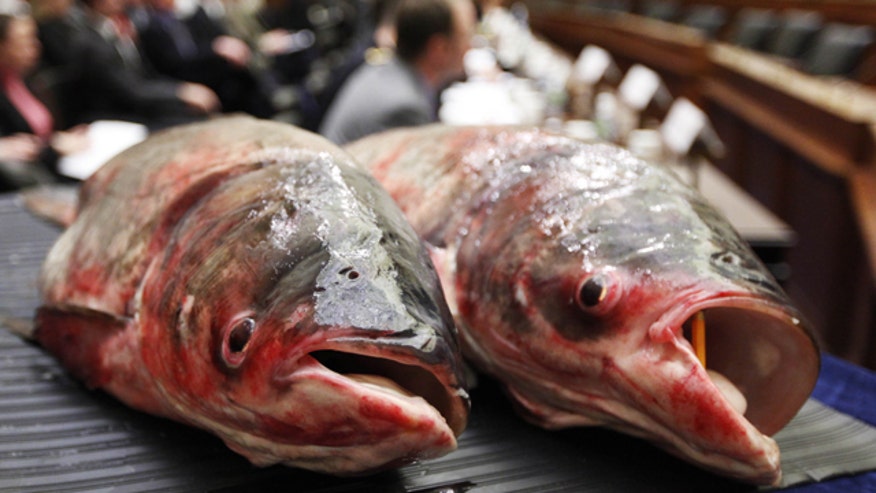New plans for fighting off an Asian carp Great Lakes invasion

New plans for fighting off an Asian carp Great Lakes invasion

State and federal agencies are at war with the Asian carp, an invasive fish species that can grow up to five feet and weigh more than a hundred pounds. (AP)
that can grow up to five feet and weigh more than a hundred pounds. (AP)
The Great Lakes are under the threat of invasion by a foreign species and the debate is raging on how it can be prevented.
State and federal agencies are at war with the Asian carp, an invasive fish species that can grow to lengths of up to five feet and weigh more than a hundred pounds.
Once an invasive species is established, it's really, really hard to eradicate, said Roger Germann, executive vice president of Chicagos Shedd Aquarium .
.
With no natural predators and insatiable appetites, Asian carp can eradicate entire fish populations by consuming nearly all of the available plankton, which are the primary food source for most fish.
plankton, which are the primary food source for most fish.
Asian carp have slowly worked their way up the Mississippi River over the last 40 years after being brought to the United States from Asia in the 1970s to help get rid of algae on catfish farms and wastewater treatment ponds.In recent years, however, the carp have been found in northern parts of the Illinois River, about 40 miles southwest of Lake Michigan.
ponds.In recent years, however, the carp have been found in northern parts of the Illinois River, about 40 miles southwest of Lake Michigan.
If Asian carp there, researchers say the entire ecosystem of the Great Lakes could be devastated, including the regions $7 billion annual fishing industry.
"This is a national treasure that we have and it's worth keeping, said Grand Rapids (Mich.) Mayor George Heartwell. It's 20% of the surface fresh water on the globe right here. We're the stewards of it and it's at risk right now."
With the invasive species on the doorstep of the Great Lakes, officials have tried a wide variety of measures to keep the fish away: water cannons that create turbulence in the river; chemical toxins; commercial fisherman; and even electric fishing.
fisherman; and even electric fishing.
"We've taken over 2.1 million pounds since 2010, said Kevin Irons of Illinois' Department of Natural Resources. We've taken as many as 80,000 or 100,000 pounds in a given week."
Resources. We've taken as many as 80,000 or 100,000 pounds in a given week."
But the Army Corps of Engineers, Heartwell and other mayors in the Great Lakes and St. Lawrence Cities Initiative say those methods along with a series of underwater electric barriers in the Illinois River still arent doing enough to completely protect the Great Lakes from Asian carp.
After two years of research , the Army Corps of Engineers earlier this year presented lawmakers with eight potential plans for protecting the Lakes. The proposal thats received the most attention would physically cut-off Lake Michigan from Chicagos waterways with a series of permanent barriers. Heartwell and others say that $18 billion plan, which is expected to take 25 years to complete, has the best shot at protecting the Lakes.
, the Army Corps of Engineers earlier this year presented lawmakers with eight potential plans for protecting the Lakes. The proposal thats received the most attention would physically cut-off Lake Michigan from Chicagos waterways with a series of permanent barriers. Heartwell and others say that $18 billion plan, which is expected to take 25 years to complete, has the best shot at protecting the Lakes.
"It's not inexpensive but it's a solution," Heartwell said. "The risk of course of not doing it is that we have a multi-billion dollar and tourism that would be devastated here in the Great Lakes."
Critics of the plan though say its too expensive, too slow, and isnt guaranteed to keep Asian carp from reaching the Great Lakes.
to keep Asian carp from reaching the Great Lakes.
The permanent barrier, depending on how simple it is or how massive it is, may not take into account some of the other waterways boats can get in, Germann said. It may not take into account a hundred-year flood that happens. So, I'm not sure that that's ultimately even at the end of the day, the permanent solution."
Chicagos waterways are also key shipping for businesses to easily ship goods from the Great Lakes, down the Mississippi River, and into the Gulf of Mexico. Permanent barriers would cost commercial shippers more than $200 million per year, according to the report.
There's no specific timeline for Congress to take action and any decision could still be a few years away, meaning Asian carp could still have a few more years to reach the Great Lakes.
years to reach the Great Lakes.




I knew they were a problem but I had no idea they got so big!!
It's a huge problem Tzia. Invasive species are not only the Asian crap, but the snakehead fishin NE area.
I've seen the Snake Head on TV....hey are phugly!
" Escargole" (sp)
Those fish weigh more that I do!!!
"Snakeheads are thrust-feeders which consume plankton , aquatic insects , and mollusks when small. As adults, they mostly feed on other fish, such as carp , or on frogs . In rare cases, small mammals such as rats are taken." (Wikipedia)
You can sick the Snakeheads on them, or maybe the Lamprey Eels.
Think of the amount of gefilte fish you could make with just one of those biggies.
"OHY" (no offense intended)
(no offense intended)
(they really do weigh more than myself)
LOL
Is there a native predator that would be beneficial rather than detrimental, that could be imported? One native predator that China has is more than 1.3 billion (sometimes hungry) people.
Your going along in your boat at 20 to 25 MPH and hit a school of these carp, when they come out of the water and smack you in the face, it's something that you won't forget.
There was a case where the fish broke the guys collar bone, jaw and nose..
Northern Pike, Muskie, Largemouth Bass, Striped Bass. Flathead Catfish, all top native predators.
Actually Royal the Northern, Muskie and Flathead will take anything that can fit in their mouth. They do take some pretty good sized fish.
Of course when the crap are running 20 to 25 lbs there is a problem.
Don't tell me you used an ice house..
Damn Royal, an ice shany...LOLOLOL
You know the only way to really ice fish, is with an auger and a spear.
Yeah, you'd probably freeze your ass off...LOLOLOL, or spear yourself in the foot.
And now there's an invasion of ginormous bullfrogs!
Wow...I didn't hear about that!!
Seems to me that the enormous bullfrogs and the Asian carp could control each other.
Sometimes these animals are deliberately introduced from another ecosystem with the best of intentions. For example, if there is a recurring, unmanageable problem with infestations by a particular insect, scientists might import a bird or snake that eats insects in large quantities.. But often the new animal gets out of hand and causes more problems than it solves.
(And its not only animals-- sometimes a plant is imported for a particular purpose-- but in its new environment it runs amok killing off lots of other, desirable, native plants).
An example is the introduction of rabbits to Australia. A true illustration of what is meant by breeding like rabbits.
hmmm....that makes a lot of sense. Thanks for sharing that. I just love it when I learn something.when I learn something)
Buzz, I didn'tthink about plants.....thanks!
You're welcome Tzia, but it was Krishna who wrote about plants.
oops...Thank you Krishna!